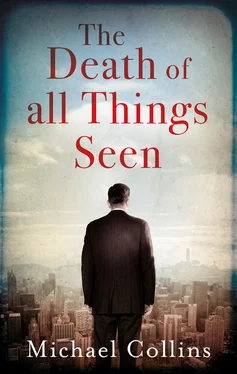Joanne had the insistent idea to bake something. She gathered ingredients in the kitchen, while Peter talked in what proved a yawning chasm of intersecting histories, Joanne understanding that the act of movement was essential to life, Peter describing further how Jessie Farmer met George Farmer going east, while passing through Oklahoma City’s Greyhound station. Jessie had stopped by the Federal Building, where Timothy McVeigh had killed all those people. George Farmer had been there and had handed Jessie a book of psalms, then asked her to pray with him for those lost. She had. George Farmer was in a black suit, like a scarecrow. His ankles showed over white socks. He was worth over two million dollars. Jessie learned it later. It didn’t change her.
Joanne said, ‘You should write all this down now, Peter, not to forget it.’
Peter didn’t get the underlying jab that she knew it was all made up. He was, he told her, lifting bales of hay in a regimen that started at five thirty, when the cock crowed. He was living the most salubrious life imaginable.
Of course, to verify any of it, Joanne might have asked simply to say hello to this Jessie Farmer, but she didn’t, because it was worth not knowing for sure. There would be, eventually, the break-up, the climax and bitter end of what had started with such promise.
It gave her an understanding of the sketched details he would pawn off on her if she called again. Instead, Joanne said in a quiet appeasement, ‘You make Oklahoma sound like it might be the answer to a great many troubles.’
Saying it stopped Peter cold, or Joanne felt it, her perceived gullibility emboldening within Peter a belief just then that he could conjure anything from make-believe.
He had determined, he told her with a rising truth, that you could scream at the top of your lungs and nobody would hear you for tens of miles, the snow on the plains, its blanketing monotony such that you could watch from a window, see the demarcation of the drive, and then the road, your escape to the outside world disappearing before your eyes in a matter of minutes.
This was suddenly the greater reality of his life. His voice was filled with a stark melancholy.
He began his poem again in earnest, fleeing from an apparent and glaring truth, so the poem was dead of whatever spark it ever contained. It was characteristic of Peter’s work and tied to his essential failing as an artist, his misconception that true genius was only ever uncovered in throwing up barriers to absolute happiness, when the opposite was most always true, and that, without a sense of openness, without love, all remained hidden behind words, or built around the fortress of poems.
Joanne said nothing. She rolled out her dough, used the depression of a cookie cutter shape to cut gingerbread men. She made a sad-faced gingerbread man, an effigy of Peter. She could almost transpose what was being said in her ear as something communicated by the gingerbread man. It made her smile, and then she thought, what might it be like to pull an arm off, one, and then the other, and the legs, too, anything to stop him?
The poem was so absolutely horrible. Were there in other professions, say in architecture, architects who couldn’t handle a protractor, or who didn’t know the basic elements of trigonometry?
What she thought of was the paunch of his belly, the way he used to advance with it between his legs. It was all a great confusion in her head, the alternative to Peter, the Robert Hoyts of the world, the self-aware, Hoyt making accommodation for a great and undeserved success that would be granted him, and, even before Robert Hoyt, the Daves of the world, those hypersexual Fonzies who would see the flare of high school notoriety pass them so quickly and who would eventually become the paranoid, hyper-religious, in their unironic Promise Keeper fidelity to Faith, Family, and Guns.
Joanne had read about them after her encounter with Dave, these Promise Keepers , who prayed before fucking, who went down on their knees and thanked God before they got a hard-on, praising Jesus through the act, and praying right after intercourse.
It seemed they were everywhere now, this fearful, vengeful stock, these reformists, those who wanted saving, so that even someone as preoccupied as Peter could not help but land upon a vague societal disaffection with his imaginary Jessie Farmer come inland from a white supremacist enclave on Whidbey Island.
Peter, she was sure, was tapping what he had witnessed in Upstate New York, Dave and Sheryl living with the confirmed belief that they were living through the last days in a world come undone by socialists, niggers and A-rabs , and that a legitimate alternative might be for Dave to pump a round of ammo into Sheryl, Misty, and the boys’ heads and then off himself with an abiding belief that life might resume under better conditions in the afterlife. It was an alternative reached by more people than anyone wanted to admit.
*
Joanne set the phone down eventually. What Peter said was not up for debate, speculation, or open to response, but a string of words spoken down the line and into the void where everything was a deep silence in the end.
Peter was still talking, and probably continued for a long time, when it didn’t rightly matter. Joanne balled the gingerbread man so he was without form. He was there if she needed, and that was enough to restore a strange confidence that all was not lost, not yet.
GRANDSHIRE WAS NOT, for Nate Feldman, the Paradise Found it had first seemed, but rather a Paradise Lost, for the leach of unseen heavy metal contaminants from the mining of the nineteenth and twentieth centuries. Most notably trace elements of zinc, cadmium, lead, manganese, nickel, and arsenic, released into stream-fed aquifers by abandoned tailing pool toxins and acid rock discharge, in the overgrowth of reclaimed operations deep in the wilderness.
The details were contained in government reports — soil analysis, evidence of contamination sources as best could be identified. For the victims, the effects were slow to manifest, but pernicious, cumulative and irreversible, leading to organ failure. Medically and legally, it was a complicated matter. At issue was the absolute causality of the associated illnesses. Lawyers and experts were lined up on both sides of the argument so it was apparent there would be no justice for the immediate victims, and little, if any, for the surviving family members.
In the interim, the witnesses were simply to put a face to a story of human tragedy. This was Ursula’s opinion. Cynicism, she said, was a white disease, and now they were going to add this injury to all that had come before. She would not allow it.
Ursula spoke of a mushroom grown in the fetid dark that allowed one to speak with their ancestors. They should know and be ready for her arrival. Death should be nothing hidden in the palliative care of a hospice on Toronto’s outskirts.
What had befallen her was better understood by the tribal leaders of old and more recently by men like Frank Grey Eyes. A disruption in the land always registered in the depletion of fish stock or the bitter taste of game when a sickness could imperceptibly slow an animal, and if caught in too great a number then the species should be left to recover.
This was generationally observed, these signaling events, and told in any number of stories of how, in ancient times, the lakes and streams and rivers sometimes churned in the turbidity of waters in a choke-out by non-indigenous grass or weed, seeds carried on the wind so a balance was upset, the soil silted so it was hard for the salmon to find their way and lay their eggs in what had been the clear pooling of once undisturbed waters. What they attributed to the Gods was not a naïve understanding of nature, but a keen observation of nature, a balance where their own temperament, their own actions connected to a cosmic harmony. Nativism was not aligned with ignorance, but a willful submission to direct observation.
Читать дальше












